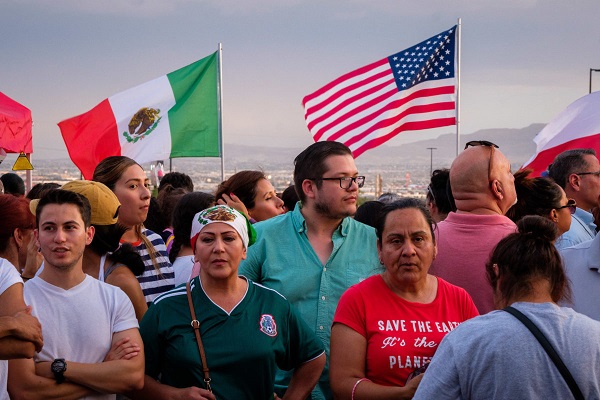By Dr. Ricardo Romo
Congressman John Lewis’s last public writing appeared in a New York Times editorial page on July 30 following his death a week earlier. He wrote: “Democracy is not a state. It is an act, and each generation must do its part to help build what we called the Beloved Community, a nation and world society at peace with itself.” His generation of civil rights activists contributed to a more robust and fair American democracy through the Voting Rights Act of 1965 and by their vigilant promotion to social justice.
“The vote,” John Lewis noted in his final letter, “is the most powerful nonviolent change agent you have in a democratic society.” He cautioned us to “use it because it is not guaranteed. You can lose it.” Lewis understood more than anyone the struggle undertaken to gain full rights to vote. The poll tax and malicious literacy tests were designed to keep Blacks from voting. Those political battles, which encompassed decades, made the fight for the Voting Rights Act ever more significant. Still, many Americans eligible to vote today fail to do so.
Using the pandemic as an excuse, President Trump proposed in a tweet this week: “Delay the Elections until people can properly, securely and safely vote.” Trump prefers to vote by mail, but he doesn’t want other American voters to have the same privilege or opportunity.
Claiming that voting by mail would be “an easy way for foreign countries to enter the race,” he suggested that the results would be “INACCURATE AND FRAUDULENT.” His proposal of delaying the election shocked even his closest allies in the Senate and House. Only the Congress has the power to delay the election, and Trump’s election solution of postponement has no appeal to Republican or Democratic leadership.
Many Latino activists and organizations are alarmed at the possibility of a Trump reelection. They remember his comments that Mexico was sending people to the United States “bringing drugs…bringing crime…They’re rapists.” Trump’s speeches are filled with vitriolic attacks on Mexicans, Muslims, and immigrants.
Trump often warned of an “invasion” from the south. That’s the same word, noted USA Today columnist Ruben Navarrette, “that 21-year-old Patrick Crusius included in a racist manifesto he wrote” before driving 700 miles to El Paso for the purpose of killing Mexicans. On August 3, he walked into a Walmart, “as he allegedly told police, to kill as many Mexicans as possible.” Crucius killed 22 people, many of them Mexican immigrants, and wounded 25 others.
The 2020 elections are especially important to the majority of Latinos who see Trump as one of the worst presidents in modern times. But as Domenico Montanaro warned in his writeup of NPR’s polling on the 2020 race, “the one group Biden continues to underperform with slightly is Latinos — 59% of Latinos said they’d vote for Biden over Trump, but Clinton won 66% of their votes in 2016.” Trump was elected with Latino support of nearly 30% according to 2016 exit polls. Many of those Latino Trumpistas are still in his camp despite the pandemic, the worst economic crisis in U.S. history, and protest marches across the country for social justice. Current polling suggests that one in four Latinos will vote for Trump in 2020.
Changes in the nation’s demographic profile have given rise to an increased number of Latino voters in the Southwestern states. In addition to those new Latino voters, increases among Black voters in several southern and midwestern states promise to play a greater role for Blacks and Latinos in the election of national and state leaders in the coming decades.
Democracy is at risk if we elect and follow incompetent, untrustworthy, dishonest, and ineffective leaders. Trump’s poor leadership has led us to the worst pandemic response in the developed world. Thousands of Americans have died because of the early inaction of President Trump. Additionally, the impact of the pandemic has led America to the greatest economic crisis since the Great Depression.
The Covid-19 pandemic has reminded us all that decisions by political leaders matter. The reopening of schools, businesses, and churches is determined by our political leaders–individuals to whom we have granted the power to decide important civil and health policies.
Voting is one of the pillars of our democracy that allows us to choose competent leaders. We must safeguard fair and inclusive elections at all costs. Democracy is threatened if we allow foreign participation in our elections or if we fail to counter misinformation about the candidates. Russian operatives funded by their government not only intervened in our 2016 presidential election, but also in the election of leaders of our closest allies in Europe. It is well known that Facebook and other social media platforms allowed Russian operatives to purchase advertisements that hurt Hillary Clinton’s chances of winning the 2016 election. We must make certain in 2020 that American voters have the right to decide our elections.
America is indeed in the midst of great soul searching over the future of democracy. “Ordinary people with extraordinary vision,” wrote John Lewis, “can redeem the soul of America.” If he is right, then Americans will persevere in the midst of these great challenges to protect the freedom, liberty, and pursuit of happiness ideals that our founding leaders believed would make the United States a great nation. Latinos must take an active leadership role in the 2020 election.


Recent Comments